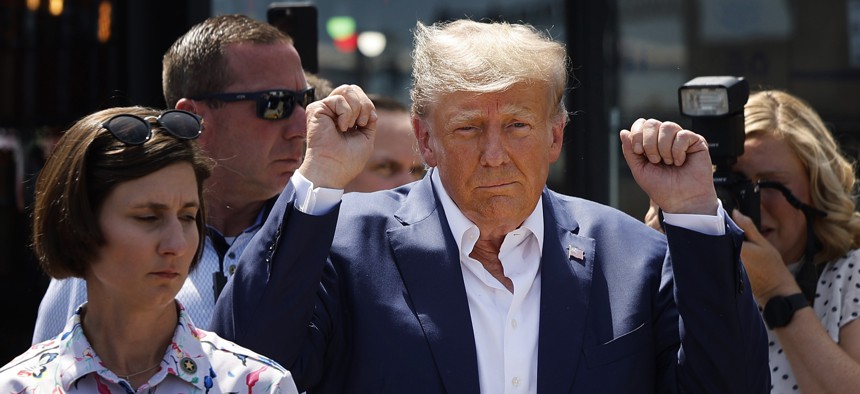Opinion
Bill Cotterell: We need to see Trump's day in court on TV
The federal courts ought to allow Trump’s trials to be televised, our Capitol Columnist writes.

Former U.S. President Donald Trump acknowledges supporters as the visits the Iowa State Fair on August 12, 2023 in Des Moines, Iowa. Photo by Chip Somodevilla/Getty Images
No one in America is above the law, and no one is below it, as we’re reminded when Florida Man Donald Trump is in the news — which will be constantly, as the 2024 presidential campaign collides with the former president’s legal troubles.
Trump is, however, different in regard to the law. You and I have the same rights he has, but it’s foolish to pretend we’re the same. That’s why the federal courts ought to allow Trump’s trials to be televised.
Recent columns by Bill Cotterell –
- Biden conference calls should have a paper trail
- Unforced errors continue to hobble DeSantis presidential campaign
- Democratic back-benchers eyeing challenge to U.S. Sen. Rick Scott
In fact, Chief Justice John Roberts ought to just march boldly into the 1970s and permit cameras in all courtrooms for all cases.
Trump would be a good starting point, as if to underscore the unique history and legal importance of what he did, how the Justice Department responded, and what it all means. Americans deserve to see and hear the testimony and legal wrangling, unfiltered by news media.
Television, for all its faults, is capable of immediacy and accuracy. Sportscasters used to say, “Let’s go to the tape,” and we’d see if some guy was out at first or if the refs missed a player stepping out of bounds. People who love Trump or hate him will quarrel over the trials anyway, but a visual record will provide a permanent documentation of facts.
So what makes Trump so different from anyone else? Well, how many other federal trials involve a man who’s been president – and wants to be again? Like him or not, this is different.
Steve Bousquet, opinion editor of the South Florida Sun Sentinel, recently noted that federal courts have forbidden cameras since 1946. That’s an interesting coincidence.
In 1946, cameras were in Nuremberg as Nazi war criminals stood trial before the world. We saw justice and fairness afforded the most vile criminals. The lights and cameras were bulky and intrusive, each requiring crews of several people, and there were teams from many nations. Yet they managed, and this was nearly 80 years ago.
Judge Lance Ito may have let the O.J. Simpson trial devolve into a silly burlesque, but that wasn’t TV’s fault. From the Army-McCarthy hearings of the 1950s, through the U.S. Senate Watergate inquiry, to last year’s special commission on the Jan. 6 rioting, television served history.
We’re not talking about an exploding flash of white powder, like photographers used in the early days of their craft, and we won’t have Geraldo strolling down the center aisle of the courtroom to tell us what it all means.
Courts could set up “pool” coverage by two or three stationary cameras that would feed signals to all stations. Camera angles could avoid showing jurors, and judges could black out certain witnesses or materials for national security.
Aside from facts, the visual impact is valuable. Television showed Americans what a reckless thug Joe McCarthy was, abusing his Senate power to smear people as communists. Seeing John Dean’s calm recitation of how Nixon obstructed justice made Watergate real for millions of average Americans.
We’ll see plenty of Donald Trump’s act in political rallies and campaign commercials, but examining him in a calm, orderly forensic setting would give Americans a new chance to size him up.
Led by Florida, courts have had a good experience with cameras. Showboating lawyers or witnesses might play to the cheap seats now and then, but that’s why judges have gavels. We don’t see a whole lot of grandstanding in state courts – at least, not caused by TV.
And yet the federal courts won’t even allow audio recording of their sessions. An iPhone in a shirt pocket can now capture what Walter Cronkite needed a team of sound, light and video technicians to record 50 years ago.
If the feds are so stuck in the 1950s that they can’t concede that technology has improved, they ought to at least make an exception for the Trump trials because of their importance. Nothing will persuade Trump’s hardcore cultists, but seeing the facts for themselves might be a dose of reality for some partisan skeptics.
Trump is equal to every other citizen before the law. But his court cases really are different.
Bill Cotterell is a retired Capitol reporter for United Press International and the Tallahassee Democrat. He can be reached at bcotterell@cityandstatefl.com.
NEXT STORY: Opinion: The math isn’t mathing on Florida abortion amendment
